Quick Reference
Partners for
Opioid Safety
Opioids911-Safety is
recommended by...
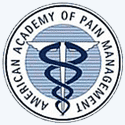
American Academy of
Pain Management
![]()
American Association
for the Treatment of
Opioid Dependence

American Chronic Pain
Association
![]()
American College of
Apothecaries
![]()
American Society for
Pain Management
Nursing
![]()
National Association
of Drug Diversion
Investigators

National Fibromyalgia
& Chronic Pain
Association
![]()
National Fibromyalgia
Association

Reflex Sympathetic
Dystrophy Syndrome
Association

The Foundation for
Peripheral Neuropathy

TNA-The Facial Pain
Association
Certifications
We comply with the
HONcode Standard
for trustworthy health
information.
![]()
Verify Here
WMA Certified

Verify Here
Opioids911-Safety has been independently developed with support provided in part by educational grants from...
Purdue Pharma L.P.
3. How can I prevent problems with opioids?
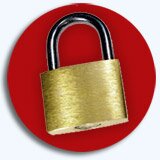
- What opioid problems should I be prepared for?
- How can opioid problems be avoided?
- How can I keep track of my opioid medicines?
- What should I do to keep my opioids safe?
- How can I dispose of unused opioid medicine?
- What should I do if my opioids are lost or missing?
A. What opioid problems should I be prepared for?
Opioid pain relievers can be safe and effective IF you follow the directions from your healthcare providers and you take steps to avoid possible problems or risks. Here are some concerns to think about...
- Opioid medicines will not work as they should if you do not take them exactly as you are instructed by the prescriber.
- Opioids can be harmful if you take too much of the medicine or take it too often. This can lead to opioid overmedication or overdose.
- A serious risk of opioid medicines is called "respiratory depression," which is dangerously slow or weak breathing.
- Opioid medicines also can cause certain troublesome side effects, most commonly constipation, nausea, or sedation.
- Constipation due to opioids may not go away, so you should ask your opioid prescriber about how to treat this.
- Nausea may last about 3 to 4 days, and there is medicine that can help with this.
- Sedation - feeling tired and groggy - may last 3 to 4 days after starting opioids or when the dose is increased.
 A complete list of opioid side effects is available <here>.
A complete list of opioid side effects is available <here>.
- Opioid medicines can be harmful to you if they are taken with alcohol or illegal drugs, or with certain other prescribed medicines.
- If others - adults, children, or pets - get hold of and swallow your opioid medicines it could injure them, possibly even causing death.
 Sharing your opioid medicine with anyone else is against the law and could do them great harm, possibly killing them.
Sharing your opioid medicine with anyone else is against the law and could do them great harm, possibly killing them.- If you ruin your opioid medicine, lose it, or it is stolen you may not be able to get it replaced until it is time for the next refill.
Knowing about what can go wrong is a first step in avoiding the problems or risks. Below are helpful next steps.
B. How can opioid problems be avoided?
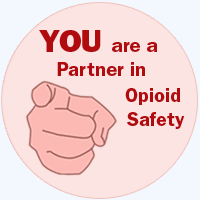 Opioid pain relievers, and many other medicines, can be dangerous if they are not used properly or are used by persons for whom they were not prescribed. Therefore, YOU are responsible for following certain safety steps to avoid problems. There are many things to remember but most of them are just good common sense.
Opioid pain relievers, and many other medicines, can be dangerous if they are not used properly or are used by persons for whom they were not prescribed. Therefore, YOU are responsible for following certain safety steps to avoid problems. There are many things to remember but most of them are just good common sense.
Here are some special opioid safety tips to remember...
- Read and make sure you understand all information that comes with your opioid prescription. Check the label - are the medicine name, dose, and how often it is to be taken the same as your opioid prescriber talked to you about? Mistakes in filling prescriptions can happen.
- Take opioids only when and how you are instructed:
 Never chew, cut, crush, or dissolve opioid tablets or open capsules, unless specifically told to do so by the prescriber or pharmacist.
Never chew, cut, crush, or dissolve opioid tablets or open capsules, unless specifically told to do so by the prescriber or pharmacist.- Opioid patches must never be cut or folded, and they need to completely stick to the skin. Always take the old patch off before putting on a new one unless you are instructed otherwise. Never apply heat to a patch, such as in a hot bath, sauna, or hot tub, or with a heating pad, electric blanket, or heat lamp.
 For opioid liquids, always ask your pharmacist for an accurate measuring device.
For opioid liquids, always ask your pharmacist for an accurate measuring device.
- Never take more opioid medicine or take it more often than has been prescribed for you. If you think that you need a higher dose, first ask your opioid prescriber.
- You (and your caregivers) should know the signs of opioid overmedication and opioid overdose to watch for.
 See a list of the signs <here>.
See a list of the signs <here>. - If there are signs of overmedication, stop taking the opioids and call your opioid prescriber for instructions or, in the United States, you also can call the National Poison Hotline toll-free at 1-800-222-1222.
- If there are signs of overdose, call emergency medical services right away.
 Section 4 <here> provides advice for what to do in an emergency until help arrives. Read it today, so you are prepared before there is an emergency.
Section 4 <here> provides advice for what to do in an emergency until help arrives. Read it today, so you are prepared before there is an emergency.
WARNING: If a child or pet ever swallows your opioid medicine, it is always an emergency. Call for help right away.
- A person just starting on opioids, or after a dose increase, should be watched closely, even during sleep, for several days or longer to see if there are signs of overmedication.
 Do not drink any alcohol (beer, wine, or hard liquor) or take other medicines (including over-the-counter products, herbs, or other drugs) while taking opioid medicines, unless your opioid prescriber says it is okay.
Do not drink any alcohol (beer, wine, or hard liquor) or take other medicines (including over-the-counter products, herbs, or other drugs) while taking opioid medicines, unless your opioid prescriber says it is okay.- Start taking a new opioid prescription, or any dose increase, during the daytime when you will be awake and other persons can watch to see how you react.
 Do not drive a car or operate dangerous equipment until you know how the opioids affect you and your opioid prescriber says it is okay.
Do not drive a car or operate dangerous equipment until you know how the opioids affect you and your opioid prescriber says it is okay.- If you have had problems in the past with substance abuse or addiction, your opioid prescriber must know about it so opioid medicine can be properly prescribed for you.
- Always keep your opioid medicines stored in a safe place. A locked box, cabinet, or drawer would be best.See below for suggestions on safe storage.
WARNING: Never share your opioid medicine with anyone else. It could do them serious harm and it also is against the law - you could go to jail for doing this.
Here are general tips for avoiding problems with any medicines...
-
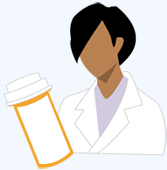 Whenever you are given a prescription for a medicine, always ask...
Whenever you are given a prescription for a medicine, always ask...
- What is the brand name and generic name of the medicine? What is the strength or dose?
- How often should I take it each day? What if I forget to take a dose?
- How will the medicine help me? What should I expect to happen? How will I feel?
- Exactly how and when should I take it? With or without food? For how many days?
- Do I need to avoid any foods, drinks, other medicines, over-the-counter products, or supplements (such as herbal products)?
- Are there any activities I need to avoid (such as driving)?
- Are there any side effects of the medicine? What should I do if they happen?
- Where can I learn more about this medicine?
- Keep your medicines in a separate place from those belonging to persons living with you, and clearly marked that they are yours. This way, you can avoid taking another person's medicine by mistake.
- Only take medicines in a well-lighted area, and wear your glasses if you need them for reading, so you can see clearly to take the right amount of the right medicine.
- Always open medicine containers over a countertop or other flat surface. Never open them over a sink or toilet where the contents can fall in and get ruined.
- If you have trouble keeping track of how to take medicines, have a helper sort them into containers for each day or several days at a time. See below about medicine organizer trays.
-
 When you are traveling...
When you are traveling...
- Take along only the amount of medicine that you will need (plus a day or two extra). It is best not to mix all the medicines into a single container.
- Keep your medicines with you at all times in a carrying bag or purse. Never pack medicines in your luggage or the trunk of a car, or leave them in your hotel/motel room.
- For opioid medicines, you may be asked by security persons to prove that they were legitimately prescribed for you. You should...
- Get a letter from your opioid prescriber stating the name of the opioid medicine, the dose, why you are taking it, and that it is needed during your trip.
- If possible, have your pharmacist provide smaller travel containers for your opioids that are properly labeled with your name and other information about the medicine.
- If you are traveling to a different time zone, ask your opioid prescriber about how to adjust the timing of when to take your medicine.
- Remember to take your medicines along if you must leave home in an emergency, such as during a flood, storm, fire, electrical failure, or other disaster.
- Be sure to have a list of your medicines with you at all times in your wallet or purse - you never know when a healthcare provider may need to know what you are taking. See below for a handy way to make your list.
- You must properly get rid of any unused or leftover medicines, or else they could be misused by others and do them harm.
 See government-approved instructions for disposing of opioids <here>.
See government-approved instructions for disposing of opioids <here>.
C. How can I keep track of my opioid medicines?
Keeping track of your medicines, and taking the right ones, in the right amounts, at the right times is necessary for safe and effective use. Plus, you do not want to be surprised by suddenly running out of medicine.
However, if you take more than one medicine, this can be difficult. So it is important to keep an up-to-date list of your medicines for your healthcare providers. And, having a list handy in your wallet or purse in an emergency can be a life saver. Here are some items that can be of help:
Keep Your Medicines Organized
Counting out individual pills or tablets each day, or several times each day, can be a chore. It is easy to forget what medicine is to be taken and when. Also, it is unsafe to keep whole containers of opioids and other medicines in places where they might be found and used or stolen by others.
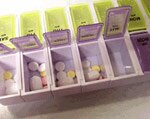 The solution is easy. Use an organizer tray that will allow you (or a helper) to count out medicines for several days or a week at a time and store them in separate compartments for each day. Some organizers also have compartments for different times during each day, such as morning, midday, evening, and bedtime.
The solution is easy. Use an organizer tray that will allow you (or a helper) to count out medicines for several days or a week at a time and store them in separate compartments for each day. Some organizers also have compartments for different times during each day, such as morning, midday, evening, and bedtime.
Medicine organizer trays are available at any pharmacy. Ask the pharmacist to help you pick one out that is best for your needs.
EXTRA SAFETY TIPS:
- Always keep the organizer tray in a drawer or other out-of-the-way place where it will be safe.
- When you fill the organizer tray, take a count of your remaining medicine to see if any is missing and to check if it is time to ask for a refill.
- If you take a liquid medicine or one that must be stored in the refrigerator, put a small reminder note in the proper compartment of the organizer for each day and time so you won't forget to take it.
- Keep medicine you take only sometimes, such as for "breakthrough pain" (which is intense pain that comes and goes), stored-away separately and safely until you need it.
Medicine & Personal Information List - MedCard
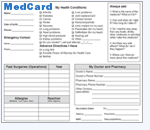 The "MedCard" provides an easy way for you to keep a record of personal information and medical history that each of your healthcare providers will want to know about. It also has spaces to write-in the medicines you are taking, including the dose, when and why it is taken, and who prescribed it. Instructions are included for how to fill-in the information and fold this document down to a size that will fit in a wallet or purse.
The "MedCard" provides an easy way for you to keep a record of personal information and medical history that each of your healthcare providers will want to know about. It also has spaces to write-in the medicines you are taking, including the dose, when and why it is taken, and who prescribed it. Instructions are included for how to fill-in the information and fold this document down to a size that will fit in a wallet or purse.
![]() MedCard PDF is available <here>.
MedCard PDF is available <here>.
Keep this MedCard with you at all times in your wallet or purse (put your insurance cards with it) and ask your healthcare providers to help you keep it updated. Show the MedCard to your pharmacist whenever you pick up a new medicine to make sure that it will not harmfully work against, or interact with, medicines or other products that you are already taking.
Emergency Medical ID Wallet Card
 At a website called "MedIDs.com" you can type-in your personal information and print a small, 2-sided wallet-sized card from your computer. It can include your name, address, phone number, emergency contact information, healthcare provider's name/phone, your blood type, medical conditions, a list of medicine names, and allergies.
At a website called "MedIDs.com" you can type-in your personal information and print a small, 2-sided wallet-sized card from your computer. It can include your name, address, phone number, emergency contact information, healthcare provider's name/phone, your blood type, medical conditions, a list of medicine names, and allergies.
The cost is free for a basic card, or there is a small yearly fee* to store your information, update it as often as you want to, and print a new card.
![]() To go to the MedIDs website <click here>.
To go to the MedIDs website <click here>.
*Opioids911 does not directly sell or endorse any products, and does not profit in any way from purchases made at listed websites. The items here are noted for information purposes only and there may be other sources for similar items.
Medical Alert ID Bracelets & Tags
 These personal identification items are important for persons who are taking opioid medicines on a long-term basis or have serious medical conditions. They can help medical workers to more quickly start lifesaving treatment in an emergency, even if you are unconscious and cannot speak.
These personal identification items are important for persons who are taking opioid medicines on a long-term basis or have serious medical conditions. They can help medical workers to more quickly start lifesaving treatment in an emergency, even if you are unconscious and cannot speak.
Different types of ID items are available, at different costs. Many of them can be engraved with several lines of vital information, such as the medicines you are taking, your medical conditions, and personal identification.
Here are a few websites offering items for purchase:*
![]() MedIDs.com <click here>.
MedIDs.com <click here>.
![]() American Medical ID <click here>.
American Medical ID <click here>.
![]() MedicAlert Foundation <click here>.
MedicAlert Foundation <click here>.
(Medical Alert Foundation also offers a 24-hour emergency medical information and notification service by subscription.)
*Opioids911 does not directly sell or endorse any products, and does not profit in any way from purchases made at listed websites. The items here are noted for information purposes only and there may be other sources for similar items.
D. What should I do to keep my opioids safe?
It is VERY important that you protect your opioid pain relievers (and other medicines) as you would your money, jewelry, or other valuables. Unfortunately, some persons coming into your home, who you may least suspect, might look for opioids to take for their own use or to sell. This includes, friends or family - especially teens and young persons - service people, or other visitors. Also, many medicines can be ruined if they are not safely kept in a proper place. Here are some tips:
- Always store medicines in a dry, cool place - not cabinets or shelves in the bathroom, which can get warm and humid. The bathroom is also the first place someone would look if they want to steal your medicines.
- Keep medicines out of the reach of children, other persons, or pets, and out of sight - never on counter tops, tables, or bedside stands.
- It is a good idea to keep a rough count of your opioid medicines - whether pills, tablets, capsules, or patches - at all times, so you will know if any are missing. On liquid containers, place a pen mark at the lowest level after taking a dose. Keep in mind that thieves can be clever and may replace medicines that they steal with something that looks similar.
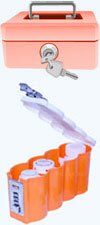 It is best to keep prescription medicines safe in a locking container, cabinet, file drawer, or desk drawer. Someone you trust should be told where the medicines are stored and given an extra key or told the combination-lock numbers.
It is best to keep prescription medicines safe in a locking container, cabinet, file drawer, or desk drawer. Someone you trust should be told where the medicines are stored and given an extra key or told the combination-lock numbers.
A website that features locking medicine containers is:*
![]() LockMed (various types of containers) <click here>
LockMed (various types of containers) <click here>
*Opioids911 does not directly sell or endorse any products, and does not profit in any way from purchases made at listed websites. The items here are noted for information purposes only and there may be other sources for similar items.
CAUTION: It is always better to go to the extra trouble of keeping medicines safe and locked up, rather than being sorry later if they are stolen and cannot be replaced, and possibly do someone harm.
E. How can I dispose of unused opioid medicine?
It is very important that you do not save leftover opioid medicines. When you are finished taking a prescription, or if you are prescribed a different opioid to take its place, the leftover medicine must be properly disposed of right away.
Why get rid of leftover opioids?
- Leftover opioid medicine can spoil with time and not work well or even be harmful if used after it has become old.
- You should not keep unused opioids in your house. You may even forget that you have them but other persons, children, or pets may find the medicines, swallow them, and do themselves serious harm.
How should you get rid of unused opioid medicines?
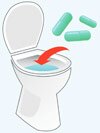 Because opioid pain relievers can be harmful to others for whom they were not prescribed - whether children, adults, or pets - the recommendation at this time is that opioids should be removed from their containers and flushed down the toilet.
Because opioid pain relievers can be harmful to others for whom they were not prescribed - whether children, adults, or pets - the recommendation at this time is that opioids should be removed from their containers and flushed down the toilet.
However, other medicines are not disposed of by flushing because there have been concerns about the chemicals getting into local water supplies. These medicines may be taken out of their containers, mixed with garbage (such as coffee grounds, food scraps, kitty litter, or other waste), put into a sealed plastic bag, and thrown into the trash.
NOTE: In all cases, the labels on medicine containers should have your name and other identifying information torn off or scratched out before being thrown into the household trash.
Drug "take-back programs" can be another good way to get rid of unused or old medicines and reduce the chance that they may end up in the wrong hands. Contact your local police department to see if there is a take-back program in your area, and if there are any rules about when and which medicines can be taken back.
You also should read the information that comes with your prescription, which usually tells how to safely dispose of the particular medicine. If in doubt, you can always ask your pharmacist.
![]()
![]() The U.S. Food & Drug Administration has a special website that talks about safe medicine disposal, including a list of opioids that should be flushed down the toilet <here>.
The U.S. Food & Drug Administration has a special website that talks about safe medicine disposal, including a list of opioids that should be flushed down the toilet <here>.
F. What should I do if my opioids are lost or missing?
If you believe that your opioid medicine has been stolen, you should call the police to file a report right away. Then, tell the healthcare provider who prescribed the opioid for you about the theft and request a replacement refill. You should be prepared to provide a copy of the police report.
If you lose or ruin your opioid medicine, call your opioid prescriber and describe what happened. However, you may not be able to get a replacement refill and will need to wait until your next refill date - so, be prepared.
![]() If you cannot get a replacement refill of opioid medicine, or you are running out of medicine early, see Section 4 <here> for how to deal with opioid withdrawal in an emergency.
If you cannot get a replacement refill of opioid medicine, or you are running out of medicine early, see Section 4 <here> for how to deal with opioid withdrawal in an emergency.
CAUTION: Doing everything you can to prevent opioid medicine theft or loss in the first place is the best approach. If either happens, your healthcare provider may be concerned that you are not responsibly and safely handling the medicine and may not continue to prescribe opioids for you.
Go to the next section:
4. What should be done in an emergency? <click here>





